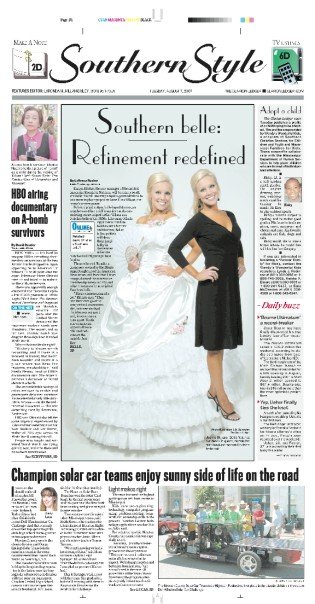The evolving Southern belle
LaReeca Rucker
The Clarion-Ledger
Karlyn Ritchie, the new manager of the antebellum home Rosalie in Natchez, will become a Southern belle this fall, wearing a replica gown identical to one worn in photographs by Anne Eliza Wilson, the home's former owner.
Polished plaid cotton, bell-shaped sleeves, an angular waist line, a full hoop skirt and a constricting corset helped define Wilson as a Natchez belle of the 1850s.
Like many Mississippi towns that lure tourists with historic architecture, belles in hoop skirts will show their hospitality in September when the Natchez Fall Pilgrimage Tour begins.
Those who visit Rosalie, a home now owned by the Mississippi Daughters of the American Revolution, will learn that Union troops claimed the mansion as their headquarters in 1863 and what it means to be an original Southern belle.
"These women endured a lot," Ritchie says. "They had their men go off to war, just as Union wives did, but they also had their houses occupied and, in some cases, torn apart. Southern women can appear all beautiful and delicate on the outside, but on the inside, these women were tough."
Southern belles of yesteryear were required to speak more than one language, play an instrument, be skilled at needlepoint and take pride in domesticity, Ritchie says. The belle was typically a rich, white woman who led an elitist, wealthy lifestyle, but today the term is more open to interpretation with Southern women from a variety of socioeconomic and ethnic backgrounds.
Indeed, modern Southern belles are redefining the term. Career-minded and independent, they have traded hoop skirts for T-shirts.
Kim Lovorn and her husband, Kelly, opened a screen-printing business in Calhoun City called Southern Belle, and two years ago, they began printing T-shirts based on the store name.
"We started with one store, and now we've grown to four stores and about 35 employees," says Lovorn of their shops in Calhoun City, Eupora, Vardaman and Magee. Lovorn says they created a line of Southern apparel that would appeal to all Southern women.
"A lot of people of color won't buy the Dixie shirt," she says, "so we decided to do the Southern belle because any girl from the South can be a Southern belle. We have people of every race who buy them because they like the sayings."
The black belle
While many Mississippi residents recognize the late Pat Fordice as a paragon of the modern Southern lady, the winner of the Miss Mississippi pageant is also seen as the state's premiere belle. That honor now belongs to Alcorn State University graduate Kimberly Morgan. The 24-year-old music teacher won the coveted crown in July, becoming the second African-American to claim the title in the pageant's 50th anniversary year.
Harry L. Watson, a history professor and director of the University of North Carolina at Chapel Hill Center for the Study of the American South, says the idea of the Southern belle has become more inclusive.
"I see more people today - North and South - adopting and discarding identities or cultural styles based on personal choice and not family or regional inheritance," he says. "I think there are a lot of identities - and not just the Southern belle, but that's certainly one of them - where people feel like they can claim them, whether they have been traditionally entitled to them or not."
Loren Powell, 17, is a member of the Facebook group "Mississippi Girls are Southern Belles." The Brandon High School student defines a belle as a "young lady of character."
"I believe that they represent what a young lady is and should be," Powell says. "Some characteristics would consist of being genuine, God-fearing, respectful and putting God first in everything she does."
Powell believes the idea of the Southern belle has evolved. "The South in general, and in particularly Mississippi, has changed from being such a racial hotbed to accepting others and the differences we each add," she says, "so therefore, being a young lady of color, I can take pride in my state and welcome the (term) Southern belle."
Mind your manners
Vicksburg native and author Jill Rigby said manners are an essential characteristic.
"A true lady has a calming affect on those she meets," says Rigby, whose new book Raising Unselfish Children in a Self-Absorbed World will be released in February. "She may be dealing with tough personal difficulties or tragedies in her family, but she has a graciousness that belies her troubles. She's more concerned with helping those around her feel comfortable than her own comfort, and she exudes humble confidence."
Rigby also believes the term "Southern belle" can be much more broadly interpreted today. "Money and race have nothing to do with having class or being a lady, which I believe is the true definition of a Southern belle," she said.
New Albany resident Nancy Shands Bass, 28, describes herself as a Mississippi girl, who loves Ole Miss football, homegrown vegetables, grits, fried catfish and a good Southern accent.
Bass, who attended etiquette classes as a child, says she feels Mississippi parents are still trying to raise Southern ladies and gents and agrees that the definition of the Southern belle has changed.
"Any Southern lady, rich or poor, can be a Southern belle with manners and grace," she says.
Endangered species
Mississippi State University student Amanda McAlpin, 27, says the Southern belle may be in danger of dying if girls emulate celebrities and TV stars who behave less than ladylike. Television today abounds with images of 'girls gone wild' and shows like VH1's "Flavor of Love," "Charm School" and "Rock of Love."
"I think Southern women want to be seen as Southern belles," she says. "Of course, as culture changes, and especially as girls are influenced by Hollywood stars who don't act like Southern belles at all, girls tend to act in ways that would have been frowned upon in past decades."
Biloxi native Nicole Roberts said she was never taught which silver patterns were appropriate for which occasion or how to stitch the family monogram, but she was taught to be a lady. Roberts says the modern belle should be given a little leeway when it comes to behavior because it's unrealistic to constantly behave like bastions of good breeding. That, however, does not excuse the negative examples of women in the media today, she said.
"I think that trend will turn," she said. "Our peers will eventually reach a point where being oversexed and overhyped for no clear reason will get old."
The Southern gent
Jason Herbert, 25, a former Mississippi resident who now lives in Roanoke, Va., said women may be proud to define themselves as Southern belles, but he believes men are also still interested in being Southern gentlemen.
"Manners are one of the most important things for day-to-day survival," he said. "I wait and hold doors open. If someone has something in their hands, I'll quicken my pace to the door in question (to help)."
Herbert says he's been scolded in the past for doing it, but his courtesy isn't meant to offend or belittle.


